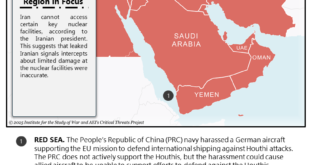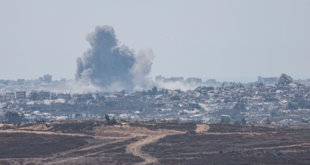 BAGHDAD (Reuters) – U.S. Democratic presidential candidate Barack Obama traveled to Anbar province on Tuesday to meet Sunni Arab tribal leaders whose decision to fight al Qaeda helped change the course of the conflict in Iraq.
BAGHDAD (Reuters) – U.S. Democratic presidential candidate Barack Obama traveled to Anbar province on Tuesday to meet Sunni Arab tribal leaders whose decision to fight al Qaeda helped change the course of the conflict in Iraq.
Obama held talks with tribal chiefs including Ahmed Abu Risha, head of the U.S.-backed Awakening Council, an alliance of tribes in the vast desert region that was once the heartland of the Sunni Arab insurgency against American forces.
After visiting Anbar, Obama flew to Jordan, next stage on a multi-nation tour that will include Israel, France, Germany and Britain.
Obama met Iraqi Prime Minister Nuri al-Maliki and American military commanders in Baghdad on Monday in a trip that was dominated by the question of when U.S. troops should leave Iraq.
U.S. strategy in Iraq and troop numbers are central issues in the election race between the first-term senator from Illinois and Republican candidate John McCain.
Abu Risha said tribal chiefs told Obama any withdrawal of U.S. forces from Anbar should be carried out cautiously.
Obama has promised to remove U.S. troops from Iraq within 16 months of taking office, should he be elected.
“We told him the withdrawal of U.S forces can happen when Iraqi forces are capable and ready to deal with the security situation in the province,” Abu Risha told Reuters after the meeting in the local capital Ramadi.
U.S. forces are due to hand security control of Anbar to Iraqi forces but local political wrangling has delayed the move.
Abu Risha took over the council from his brother, who was killed in a bomb attack last September just days after he met President George W. Bush at a U.S. air base in Anbar.
Anbar was once the most dangerous region for U.S. troops.
But in late 2006, tribal leaders sick of al Qaeda’s indiscriminate killing of civilians and austere version of Islam joined with the U.S. military and largely expelled the group.
Al Qaeda had also become a serious challenge to tribal authority and sought control over economic activities and smuggling routes to neighboring countries.
Violence fell sharply and that model for cooperation was copied in Baghdad and other parts of Iraq. Since then, al Qaeda has been increasingly squeezed into Iraq’s northern provinces.
BROWN SEES CHANGE IN UK ROLE
In London, British Prime Minister Gordon Brown told parliament he expected to see a “fundamental change of mission” for British troops in southern Iraq early next year.
The improved security situation in the Basra region meant the 4,100 British troops based there would focus on training Iraqi troops before gradually withdrawing from Iraq, he said.
Maliki told Obama and the other U.S. lawmakers on Monday he hoped U.S. combat troops could be out of Iraq in 2010, a goal not far apart from Obama’s own pledge on withdrawals.
With violence at its lowest level since early 2004, Iraqi officials have spoken with growing confidence about timetables and timeframes for U.S. forces to leave.
“Iraqis want an aspirational timeline, with a clear date, for the redeployment of American combat forces,” said a statement from Obama and the lawmakers traveling with him.
“(Maliki) stated his hope that U.S. combat forces could be out of Iraq in 2010.”
McCain himself appeared to leave the door open on Monday to a large-scale drawdown of U.S. troops in the next two years if conditions on the ground were suitable, saying success had made it possible for troops to return home.
His spokesman said the senator’s comments did not reflect a shift in position. McCain has long argued against setting a timetable for a U.S. troop withdrawal.
Some Iraqis believe their security forces are not ready and that a premature removal of the 147,000 U.S. troops in Iraq could tip the country back into widespread violence.
Maliki and U.S. President George W. Bush agreed last week to set a “time horizon” for reducing U.S. forces in Iraq, the closest Washington has come to acknowledging the need for a withdrawal timeframe.
Obama has criticized McCain and Bush for making Iraq the centre of the battle against terrorism.
He made his opposition to the U.S.-led invasion of Iraq in 2003 a centerpiece of his election campaign.
McCain has accused Obama of failing to acknowledge the security gains in Iraq from a U.S. troop “surge” that Bush ordered in early 2007. Bush deployed 30,000 extra soldiers to try to drag Iraq back from all-out sectarian war. The last of those reinforcements left Iraq at the weekend.
 Eurasia Press & News
Eurasia Press & News


